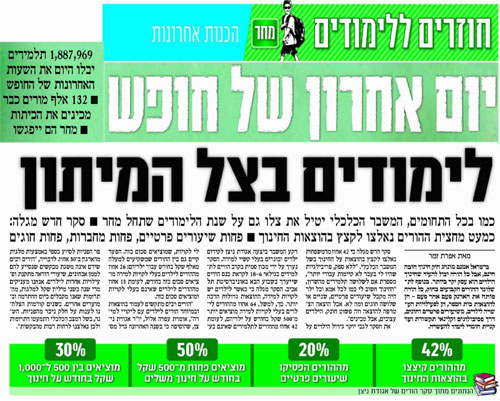From a Survey Conducted by Nitzan Israel: 42% of parents this year cut back on their children's welfare
How much does the average Israeli spend on after-school clubs and private tutors for each child? Does the parent of a child with learning disabilities spend more or less than the average?
Nitzan Israel presents finding from a survey that was conducted by the Smith-Kalka Research Institute in honor of the opening of the new school year and in preparation for the Parents' Convention that will take place on the 7th of September at Tel-Aviv University.
The findings teach that the economic crisis led this year to a cut in expenses of raising children of a significant portion of families in Israel. 42% of all of the parents (of children aged 6-18) were forced to cut back last year in activities connected to their children (clubs, private tutoring sessions, recreational activities, psychological and other treatments). A fifth of parents were forced to cut back on private tutoring sessions because of budget constraints.
Some 50% of the parents noted that the expense of their children (clubs, psychological treatment, private tutoring sessions, and different activities) is up to 500 shekels a month.
Approximately 50% of the parents noted that the expense is more than 500 shekels (18% of the parents noted that the expense is more than 1000 shekels).
Who Spends the Most?
The average expenses of parents of children with learning disabilities are higher than that of parents of children without learning disabilities. Among those that have children with learning disabilities, 64% spend more than 500 shekels per month, in contrast to only 42% that spend this amount among parents of children without disabilities. The gap becomes greater with the higher level of expenses. 26% of parents of children with learning disabilities spend more than 1000 shekels per month in contrast to only 13% of parents of children without learning disabilities.
53% of all parents reported that their children (as mentioned aged 6-18) receive private tutoring sessions. A higher percentage of students with learning disabilities (60%) are helped by these private tutoring sessions in contrast to a lower percentage among students without learning disabilities (48%).
The survey checked if there was a cut back in the financial expenses on private tutoring sessions. 18% of all parents gave up last year on private tutoring sessions for their children, or cut back on the amount of sessions in contrast to last year. We're talking about 24% of parents of children with learning disabilities in contrast to 15% of parents of children without learning disabilities.
Was the Cut Back a Result of Budget Constraints?
Three out of every four parents cut back on private tutoring sessions because of budget constraints (68% of parents of children with learning disabilities in contrast to 82% of parents of children without disabilities).
Ophra Elul, president of Nitzan Israel says, "Parents are having difficulty financing the treatment expenses for their children, especially parents of children with learning disabilities. During the past year, we're seeing the economic crisis knocking on the doors of Nitzan. The number of parents who requested from us grants rose by 30% and also the cases that we are receiving are more difficult. Many parents, who lack financial means, are requesting from us to help them fund their evaluations, remedial instruction classes, and other activities for children. We award each year approximately 2 million shekels in grants from donations that we receive from our annual Fundraising Drive and other occasions. In previous years we were successful in providing for a significant number of the requests. This year, despite the pain and anguish, we were forced to reject a number of the requests."
Maly Danino, executive director of Nitzan Israel, recommends to parents to ask questions in the Nitzan Internet forum and to consult on various subjects without a fee. It's possible to receive answers to questions such as: How to direct the monetary costs to the proper channels? How to make correct decisions regarding in what to invest to progress the child, to help him, and to support him?
According to Danino, "On the 7th of September at the Parents Convention that will take place at Tel-Aviv University, we will address the issue of monetary aspects related to raising children".
